
Economic Anthropology
Scope & Guideline
Bridging Disciplines for a Deeper Economic Understanding
Introduction
Aims and Scopes
- Cultural and Social Dimensions of Economics:
The journal explores how cultural beliefs and social practices influence economic behaviors, decisions, and systems. It emphasizes the importance of understanding economic activities within their cultural contexts. - Ethnographic Research Methods:
Economic Anthropology prioritizes qualitative, ethnographic research methodologies that provide deep insights into the lived experiences and practices of individuals and communities in various economic settings. - Value Creation and Exchange:
Research often centers on how value is defined, created, and exchanged within different societies, including informal economies, solidarity economies, and alternative economic practices. - Interdisciplinary Approaches:
The journal encourages interdisciplinary dialogue, integrating perspectives from economics, sociology, political science, and environmental studies to enrich the understanding of economic phenomena. - Focus on Well-being and Sustainability:
There is a consistent emphasis on well-being, exploring how economic practices can contribute to or detract from community health, sustainability, and social justice. - Political Economy and Economic Sovereignty:
The journal examines the relationships between states, markets, and communities, analyzing how power dynamics and political structures affect economic practices and individual livelihoods.
Trending and Emerging
- Well-being and Economic Practices:
A notable increase in research exploring the relationship between economic practices and individual/community well-being suggests a growing recognition of the importance of holistic approaches to economics. - Solidarity and Alternative Economies:
Emerging themes around solidarity economies and alternative economic practices reflect a shift towards exploring cooperative models that prioritize social welfare over profit maximization. - Digital Finance and Technology:
The journal is increasingly addressing the impacts of digital finance and technological advancements on economic practices, highlighting issues of accessibility, inequality, and innovation. - Climate Change and Economic Responses:
Research focusing on the intersections of climate change and economic practices is on the rise, emphasizing the need for sustainable practices and the role of anthropology in addressing environmental challenges. - Race, Inequality, and Economic Justice:
There is a growing emphasis on examining the intersections of race, economic inequality, and social justice, reflecting broader societal conversations about equity and reparative economics. - Contested Values and Market Dynamics:
Emerging studies on the contested nature of value in market societies suggest a critical examination of how values shape economic interactions and the implications for social structures.
Declining or Waning
- Traditional Capitalism Critiques:
While critiques of national capitalism were once prevalent, recent publications suggest a waning focus on traditional capitalist frameworks. Instead, there is a growing interest in alternative economic models and practices. - Historical Economic Models:
Research that heavily focuses on historical economic models is less frequent, indicating a shift towards contemporary issues and emerging economic practices over historical analyses. - Rural Economies and Agriculture:
The examination of rural economies and traditional agricultural practices has seen a decline, possibly overshadowed by urban economic issues and global supply chain analyses. - Nostalgic Perspectives on Economy:
Themes centered on nostalgia for past economic systems or practices are less common, as the journal shifts towards more critical and forward-looking analyses of current economic challenges. - Overemphasis on Individualism:
There seems to be a reduction in the focus on individualistic economic behaviors, with more emphasis on collective economic practices and community-based approaches.
Similar Journals
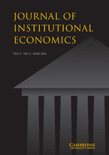
Journal of Institutional Economics
Unraveling the Impact of Institutions on Economic SystemsJournal of Institutional Economics, published by Cambridge University Press, stands as a premier forum for the dissemination of research at the intersection of economics, institutions, and governance. With an ISSN of 1744-1374 and E-ISSN 1744-1382, this journal has established itself as a vital resource within the academic community, achieving an impressive Q1 ranking in the field of Economics, Econometrics and Finance as of 2023. The journal's focus on institutional analysis not only enhances our understanding of economic phenomena but also fosters interdisciplinary dialogue among scholars and practitioners alike. With a commendable rank of 39 out of 288 in Scopus rankings, placing it in the 86th percentile, the Journal of Institutional Economics provides access to groundbreaking research that holds significant implications for policy and decision-making. Researchers, professionals, and students engaged in the study of economic systems will find this journal an invaluable addition to their academic resources.
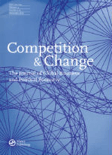
Competition & Change
Unveiling the Forces Behind Competition and ChangeCompetition & Change is a premier journal published by SAGE Publications Ltd, dedicated to the field of business, management, and accounting. With an impressive 2023 Q1 ranking and a notable Scopus rank of #39 out of 218 in its category, it stands out as an influential platform for contemporary research, thus reflecting an esteemed 82nd percentile in terms of impact. The journal spans a broad array of topics surrounding the dynamics of competition and change within various business environments, making it essential reading for professionals, academics, and students alike. Designed to foster dialogue and innovation, the journal publishes high-quality original research articles, reviews, and case studies that examine critical challenges and trends in business today. With its commitment to pioneering insights and interdisciplinary approaches, Competition & Change is poised to shape the future of management scholarship and practice.

Anthropological Notebooks
Cultivating Innovative Ideas in Contemporary AnthropologyAnthropological Notebooks, published by the SLOVENE ANTHROPOLOGICAL SOC, is a noteworthy journal within the field of anthropology. Established in Slovenia, this journal aims to provide a platform for scholarly dialogue and dissemination of anthropological research, fostering interdisciplinary approaches and global perspectives. Although it currently holds a Q4 quartile ranking in anthropology and ranks #421 out of 502 in Scopus, it serves as an essential conduit for emerging voices and innovative ideas in the discipline. Covering research published from 2010 to 2019 and from 2021 to 2024, the journal invites contributions that explore diverse cultural narratives and anthropological insights. Despite its limited open access options, Anthropological Notebooks remains a crucial resource for researchers, professionals, and students seeking to engage with contemporary anthropological discourse and enrich their understanding of human societies.
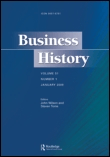
BUSINESS HISTORY
Advancing Knowledge at the Intersection of Business and HistoryBUSINESS HISTORY, published by Routledge Journals, Taylor & Francis Ltd., is a prominent academic journal based in the United Kingdom that has been contributing to the field of business history since 1958. With ISSN 0007-6791 and E-ISSN 1743-7938, this journal has successfully carved a niche within interdisciplinary spheres, achieving a 2023 Q2 ranking in Business and International Management and Business, Management and Accounting (miscellaneous), alongside a prestigious Q1 ranking in History. As an essential resource for researchers, professionals, and students alike, it offers valuable insights into the evolution of business practices and their socio-economic impacts, bridging the gap between historical events and contemporary business strategies. Although it is not an open-access publication, the journal's rigorous peer-review process ensures high-quality research visibility. Positioned in the 95th percentile in History and the 50th percentile in Business Management according to Scopus rankings, BUSINESS HISTORY is indispensable for those seeking to deepen their understanding of the historical contexts that shape the current business landscape.
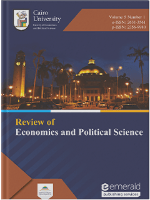
Review of Economics and Political Science
Empowering research that shapes global economics and governance.Review of Economics and Political Science, an esteemed publication by EMERALD GROUP PUBLISHING LTD, stands at the forefront of interdisciplinary research, exploring the intricate relationships between economics, political science, and societal dynamics. Since its transition to an Open Access format in 2018, the journal has provided global accessibility to cutting-edge research, fostering a rich dialogue among scholars and practitioners in the fields of Applied Mathematics, Econometrics, and Political Science. With a commendable Q2 ranking in multiple categories including Economics and Political Science, the journal offers a robust platform for high-impact studies that drive innovation and policy development. Located in the United Kingdom, it caters to an international audience and actively contributes to the academic discourse, as evidenced by its solid performance in Scopus rankings. Researchers, professionals, and students alike will find invaluable insights within its pages, making it a vital resource for understanding contemporary economic and political challenges.
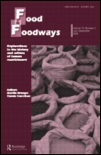
Food and Foodways
Investigating the Role of Food in Cultural NarrativesFood and Foodways, published by Routledge Journals, Taylor & Francis Ltd, is a leading interdisciplinary journal dedicated to exploring the complex relationships between food and cultural practices across diverse societies. With its ISSN 0740-9710 and E-ISSN 1542-3484, this journal has established itself as a vital resource for researchers and academics alike, featuring contributions that reflect a wide-ranging scope of issues related to food consumption, production, and identity. As evidenced by its impressive Scopus rankings, including Q1 in Cultural Studies and Q2 in Anthropology, Food and Foodways plays a crucial role in advancing scholarship in the fields of sociology, health (social science), and food science. The journal seeks to foster a deeper understanding of how culinary practices shape and are shaped by social structures, cultural values, and economic conditions. With its commitment to publishing high-quality research from 1985 to the present, it continues to attract a diverse readership, providing essential insights that are relevant to both academic inquiry and practical applications in today’s global food landscape.
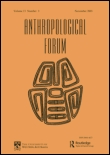
Anthropological Forum
Fostering Critical Conversations in AnthropologyAnthropological Forum, an esteemed journal in the field of anthropology, is published by Routledge Journals, Taylor & Francis Ltd. With an ISSN of 0066-4677 and an E-ISSN of 1469-2902, the journal has cemented its reputation for fostering critical discussions and innovative research since its inception in 1963. Covering a broad range of topics within anthropology, it has achieved an impressive Q1 ranking in the category of Anthropology and a Q2 ranking in Arts and Humanities (miscellaneous) in 2023, showcasing its pivotal role in advancing scholarly discourse. With a Scopus ranking placing it in the top 10% of its field, the journal provides valuable insights into contemporary anthropological issues, making it an essential resource for researchers, professionals, and students alike. Although not an open-access journal, the comprehensive studies and articles published within its pages contribute significantly to the academic and professional community. Addressed out of Milton Park, Abingdon, UK, the Anthropological Forum remains a seminal platform for disseminating high-quality anthropological research.
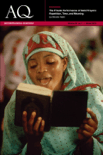
ANTHROPOLOGICAL QUARTERLY
Advancing Ethnographic Insights for TomorrowANTHROPOLOGICAL QUARTERLY, published by the George Washington University Institute of Ethnographic Research, stands as a vital resource in the field of anthropology and broader arts and humanities studies. With an ISSN of 0003-5491 and an E-ISSN of 1534-1518, this esteemed journal has been contributing to academic discourse since its establishment in 1981. The journal holds a respected position in both the Q2 category for Anthropology and the Q2 category for Arts and Humanities (miscellaneous), demonstrating its impact and relevance, as evidenced by its rank of #152 out of 502 in the Social Sciences sector for anthropology and rank of #179 out of 552 in the Arts and Humanities field. Researchers, professionals, and students can rely on ANTHROPOLOGICAL QUARTERLY for rigorous peer-reviewed articles that push the boundaries of ethnographic research and anthropological theory, addressing contemporary issues with scholarly precision. The journal’s commitment to fostering critical analysis and interdisciplinary perspectives establishes it as an essential platform for advancing knowledge within its diverse and dynamic field.
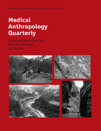
MEDICAL ANTHROPOLOGY QUARTERLY
Fostering Insightful Discourse in Medical AnthropologyMedical Anthropology Quarterly is a premier academic journal published by Wiley, dedicated to advancing the interdisciplinary field of medical anthropology. With an ISSN of 0745-5194 and an e-ISSN of 1548-1387, this highly esteemed journal encompasses a wide array of topics at the intersection of health, culture, and society, reflecting the complexities of medical practices across diverse populations. As a testament to its impact, it boasts a Q1 ranking in Anthropology and a strong performance in related fields, landing at #37 in Social Sciences Anthropology according to Scopus rankings, placing it in the top 92nd percentile of its category. Published quarterly, Medical Anthropology Quarterly serves as a critical platform for researchers, professionals, and students alike, fostering rigorous academic discourse and providing insights relevant to contemporary health issues. While it does not offer open access options, the journal's wide circulation and esteemed reputation make it an invaluable resource for anyone engaged in the study of health and culture. Join the ongoing scholarly conversation that shapes our understanding of health in a global context, as we continue to explore the dynamic interplay between medical practices and human experiences.

Transnational Corporations Review
Unraveling the Impact of Transnational CorporationsTransnational Corporations Review is a prestigious academic journal published by Elsevier Science Inc., housed in the Netherlands, which has established itself as a critical forum for the examination and analysis of transnational corporations’ roles in the global economy. With an impressive impact factor and consistent rankings within the Q2 and Q3 categories across fields such as Business and International Management, Development, and Finance, this journal offers invaluable insights that appeal to researchers, professionals, and students alike. The journal spans a broad spectrum of critical topics, focusing on the intersection of corporate strategies and international market dynamics and actively encourages contributions that enhance our understanding of economic and business environments. With a commitment to fostering scholarly discourse, Transnational Corporations Review serves as a vital resource for anyone interested in the complexities and challenges of contemporary transnational business operations. Current and past issues can be accessed via reputable academic databases, ensuring that this journal remains visible and impactful within the academic community.